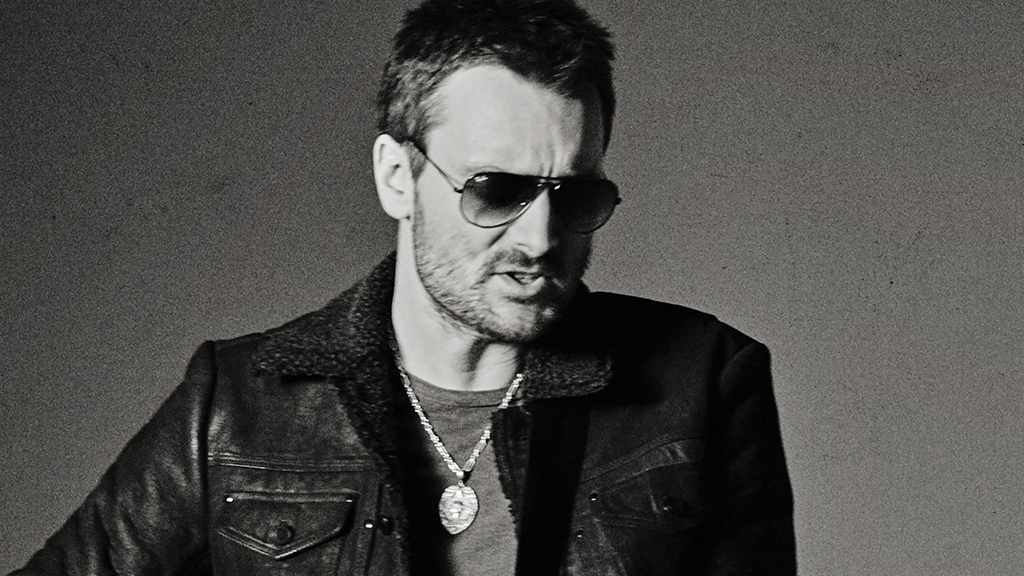You meet all sorts of people on the road to Nashville nowadays. There’s Bret Michaels, in regulation jeans and Stetson, plugging roadhouse-ready single Girls On Bars. There’s Sebastian Bach, wheat stalk in his mouth, winning the US reality show Gone Country. Even Steven Tyler is angling for his slice of the pie, decorating new solo tracks such as Love Is Your Name with fiddle and lap steel, and declaring country “the new rock ‘n’ roll”.
It’s certainly the new money-spinner, with such heavy hitters as Toby Keith and Kenny Chesney banking north of $50 million a year. But if there are no prizes for guessing why so many rockers are moving in on Nashville, it’s harder to fathom why Eric Church is headed in the opposite direction. After 2011’s two-million-selling Chief, the 39-year-old could have capitalised with a run of albums aimed squarely at the yee-haw dollar. Instead, he’s put out two albums – 2014’s metal-tinged The Outsiders and 2015’s soul rocking Mr Misunderstood – that, if not quite burning his bridges, certainly flick a Zippo in their general direction.
“We’ve always been on the edges of country,” considers Church. “But it’s funny, because when Chief happened, we became arguably one of the biggest acts in the format. And I think we kinda pulled to the middle. I’m real uncomfortable there. To me, it’s always been about trying to get out on the edges. And to stay out there.”
Most platinum-selling behemoths like to think they’re still ‘outsiders’, of course, and it’s easy to be sceptical when you scan Church’s recent tour itinerary and spot the O2. But he gives the impression he really does miss making music on the fringes, and would happily trade the world’s stadia for the straw-on-the-floor dives of his formative years.
And there were plenty of those in his native North Carolina. “We played some rough places back in the early days,” he recalls. “Little dives, roadhouses. When you’re a kid of 19, you get in some interesting discussions with people. My brother was in the band at that point, and I remember this one time, he got in a disagreement with a guy, and they stepped outside. I was thankful we were playing an Allman Brothers number because it was about eight minutes long, so he got back in time for the next song. He was just a little dishevelled.”
Do you think it’s important to slug your way up like that?
Church nods: “It’s invaluable. It’s the greatest disservice we do to young musicians now. These reality shows where people sing somebody else’s song, then they’re put on TV in front of millions and handed a recording contract. None of that is gonna work. There’s a million good singers. There’s a million good players. It’s your commitment to it that turns you into what you’re supposed to be. And that happens in bars, in clubs, in getting rejected. The grind of it, y’know?
“If the Chief album had been the first album of our career – not the third – I don’t think we’d be here right now. Because there would have been no foundation. There would have been nothing there to build upon. It would have just been: boom! Success! It would have been disastrous.”
If fast bucks were Church’s priority, he could have got them after graduating with a business degree from Appalachian State University. “I had a fiancée at the time,” he explains, “and all of a sudden, I had this corporate job offer. Y’know, two paths diverged there. I could go one way or the other. And I chose to grab a guitar and go try my luck. When you let a door like that close, it’s a big thing. I remember what it was like for that door to close. I remember what it was like to get into Nashville, Tennessee, and not feel sure that I’d made the right choice.”
Church proved a safe pair of hands as a songwriter-for-hire, composing the first of many liquor-titled cuts for Terri Clark (The World Needs A Drink) and Dean Miller (Whiskey Wings). His own solo career took longer to take off. Capitol Nashville dithered for a time (“In the beginning, we didn’t think the music was interesting enough,” admits Vice President of A&R Autumn House-Tallant), finally taking a punt on Church after he blossomed in partnership with producer Jay Joyce. Even then, 2006’s Sinners Like Me and 2009’s Carolina still saw him ignored by country radio – usually the kiss of death to an artist’s commercial hopes.

“If you listen to the last verse of Mr Misunderstood,” says Church, “when it’s talking about people trying to find the next big thing: we were right there, and nobody thought we would do anything serious. Other people were zooming past us, getting success. That song talks about taking a left when the world went right. But it’s also championing people who march to the beat of their own drum.”
For Church, the only option was to tour the band almost into the ground, creating a word-of-mouth buzz that meant the country market was eventually ready for Chief. Yet the hysteria didn’t suit him. “It was actually a hard thing for me. We went from minimal success to a double-platinum album, No.1 songs, album of the year, arena tours, everything… We went from a 1,000-person club to a 10,000-seat arena, in ten months. All of a sudden, there’s 10,000 people – and I didn’t know how they got there.
“I didn’t deal with it great at all,” he admits. “I still say that’s the weirdest time of my career. It’s probably the least fun I’d ever had. I was still insecure when Chief happened. I was more secure in a bar or club. There’s an internal thing that you go through, where you know your identity, what your lane is. It becomes this whirlwind. We were just absolutely runnin’, gunnin’, interviews, touring, massive crowds…. Frankly, I probably only remember half of the shows, if that. After Chief, I don’t know how many more albums I had in me.”
Having recoiled from prime-time success, Church’s more experimental sound is understandable. He’s a slippery customer, though, admitting to a teenage appreciation of Metallica, Pantera and AC/DC (“I’m a child of the 80s and that’s what I grew up on”), but bobbing and weaving when I suggest The Outsiders had more of a hard rock flavour than we’d expected from him.
“I don’t ever want to be involved too much in any one genre or one style because I feel like that’s just a dangerous place for me. I think, creatively, The Outsiders was a very good album for us because I went a little wild and out-there – and it still worked.
“I’m just not a guy who’s comfortable in the same place,” he decides. “I get bored easily. I would rather be doing something that creatively gets me going.”
Mr Misunderstood, plainly, is what gets Church going. Recorded in a 10-day session, these rock and soul-flavoured tracks are simple by design. “It all happened so fast,” he remembers. “There was no time to over-analyse. We were knocking out a song in a day – or even less. It wasn’t over-thought. It wasn’t hyped. Y’know, back in the Muscle Shoals days, you went in, you recorded, and if you liked it, it was on the radio that afternoon.”
If that sounds like an oversimplification then it’s pretty much what happened. In November 2015, out of the blue, Church gave away physical copies of Mr Misunderstood to his fan club members, before releasing the album without advertising fanfare or marketing froth. Even so, with the album reaching No.2 on the Billboard chart, maybe Church’s defection from country isn’t so crazy after all.
“Do I care how Mr Misunderstood sells?” he ponders. “Yes and no. The longevity is what’s more important than anything. Just to make music that, over time, people can still harken back to and say, ‘That was a great album.’ I would take that over whatever any number would be. I just feel this album. I feel it…”
The 25 best country rock songs of all time
The six best new artists making country rock their own
Steven Tyler: a little bit country, a little bit rock'n'roll

